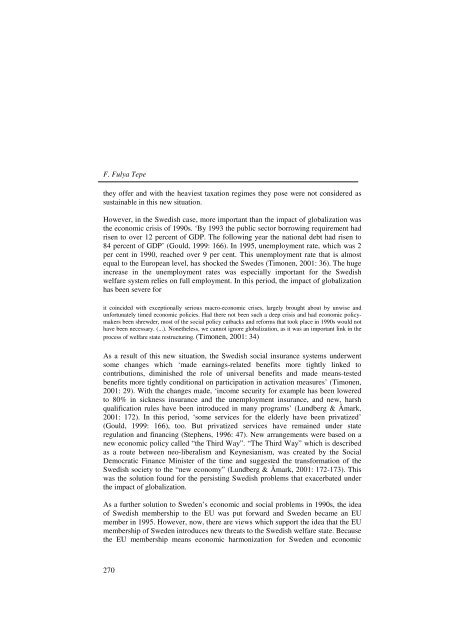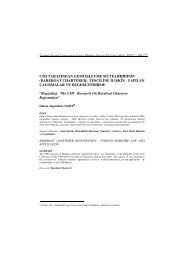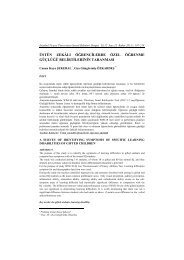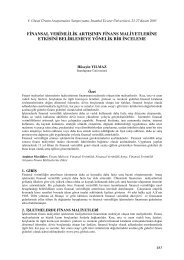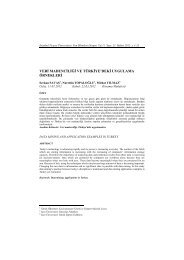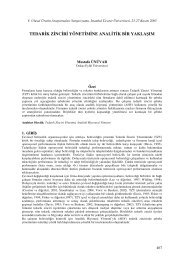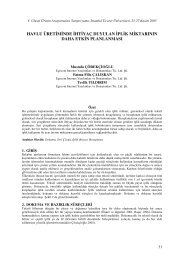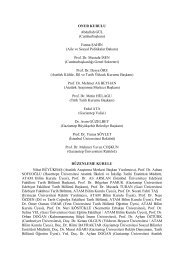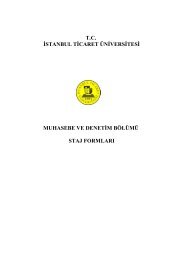F. Fulya Tepe<strong>the</strong>y offer <strong>an</strong>d with <strong>the</strong> heaviest taxation regimes <strong>the</strong>y pose were not considered assustainable in this new situation.However, in <strong>the</strong> Swedish case, more import<strong>an</strong>t th<strong>an</strong> <strong>the</strong> impact of globalization was<strong>the</strong> economic crisis of 1990s. ‘By 1993 <strong>the</strong> public sec<strong>to</strong>r borrowing requirement hadrisen <strong>to</strong> over 12 percent of GDP. The following year <strong>the</strong> national debt had risen <strong>to</strong>84 percent of GDP’ (Gould, 1999: 166). In 1995, unemployment rate, which was 2per cent in 1990, reached over 9 per cent. This unemployment rate that is almostequal <strong>to</strong> <strong>the</strong> Europe<strong>an</strong> level, has shocked <strong>the</strong> Swedes (Timonen, 2001: 36). The hugeincrease in <strong>the</strong> unemployment rates was especially import<strong>an</strong>t for <strong>the</strong> Swedish<strong>welfare</strong> system relies on full employment. In this period, <strong>the</strong> impact of globalizationhas been severe forit coincided with exceptionally serious macro-economic crises, largely brought about by unwise <strong>an</strong>dunfortunately timed economic policies. Had <strong>the</strong>re not been such a deep crisis <strong>an</strong>d had economic policymakersbeen shrewder, most of <strong>the</strong> social policy cutbacks <strong>an</strong>d reforms that <strong>to</strong>ok place in 1990s would nothave been necessary. (...). None<strong>the</strong>less, we c<strong>an</strong>not ignore globalization, as it was <strong>an</strong> import<strong>an</strong>t link in <strong>the</strong>process of <strong>welfare</strong> <strong>state</strong> restructuring. (Timonen, 2001: 34)As a result of this new situation, <strong>the</strong> Swedish social insur<strong>an</strong>ce systems underwentsome ch<strong>an</strong>ges which ‘made earnings-related benefits more tightly linked <strong>to</strong>contributions, diminished <strong>the</strong> role of universal benefits <strong>an</strong>d made me<strong>an</strong>s-testedbenefits more tightly conditional on participation in activation measures’ (Timonen,2001: 29). With <strong>the</strong> ch<strong>an</strong>ges made, ‘income security for example has been lowered<strong>to</strong> 80% in sickness insur<strong>an</strong>ce <strong>an</strong>d <strong>the</strong> unemployment insur<strong>an</strong>ce, <strong>an</strong>d new, harshqualification rules have been introduced in m<strong>an</strong>y programs’ (Lundberg & Åmark,2001: 172). In this period, ‘some services for <strong>the</strong> elderly have been privatized’(Gould, 1999: 166), <strong>to</strong>o. But privatized services have remained under <strong>state</strong>regulation <strong>an</strong>d fin<strong>an</strong>cing (Stephens, 1996: 47). New arr<strong>an</strong>gements were based on <strong>an</strong>ew economic policy called “<strong>the</strong> Third Way”. “The Third Way” which is describedas a route between neo-liberalism <strong>an</strong>d Keynesi<strong>an</strong>ism, was created by <strong>the</strong> SocialDemocratic Fin<strong>an</strong>ce Minister of <strong>the</strong> time <strong>an</strong>d suggested <strong>the</strong> tr<strong>an</strong>sformation of <strong>the</strong>Swedish society <strong>to</strong> <strong>the</strong> “new economy” (Lundberg & Åmark, 2001: 172-173). Thiswas <strong>the</strong> solution found for <strong>the</strong> persisting Swedish problems that exacerbated under<strong>the</strong> impact of globalization.As a fur<strong>the</strong>r solution <strong>to</strong> Sweden’s economic <strong>an</strong>d social problems in 1990s, <strong>the</strong> ideaof Swedish membership <strong>to</strong> <strong>the</strong> EU was put forward <strong>an</strong>d Sweden became <strong>an</strong> EUmember in 1995. However, now, <strong>the</strong>re are views which support <strong>the</strong> idea that <strong>the</strong> EUmembership of Sweden introduces new threats <strong>to</strong> <strong>the</strong> Swedish <strong>welfare</strong> <strong>state</strong>. Because<strong>the</strong> EU membership me<strong>an</strong>s economic harmonization for Sweden <strong>an</strong>d economic270
Bahar 2005/1harmonization, in turn, implies harmonization in social policies (Gould, 1999: 171).For example, Gould <strong>state</strong>s that <strong>the</strong> objective of meeting <strong>the</strong> Europe<strong>an</strong> Mone<strong>to</strong>ryUnion (EMU) convergence criteria was one of <strong>the</strong> reasons behind <strong>the</strong> Swedishefforts <strong>to</strong> reduce <strong>the</strong> above presented negative economic figures which resulted innarrowed social <strong>an</strong>d public expenditure. However, <strong>the</strong> Social Democrats whosupport membership in <strong>the</strong> EU provide arguments in <strong>the</strong> opposite way. According <strong>to</strong><strong>the</strong>m ‘<strong>the</strong> cuts <strong>to</strong> public <strong>an</strong>d social expenditure may have happened a little moreswiftly because of <strong>the</strong> EMU convergence criteria but (...) <strong>the</strong>y would have occurred<strong>an</strong>yway due <strong>to</strong> domestic <strong>an</strong>d international pressures’(Gould, 1999: 166).Never<strong>the</strong>less, even this argumentation c<strong>an</strong>not convince Swedes who are known as“reluct<strong>an</strong>t Europe<strong>an</strong>s” (Gould, 1999: 172); especially <strong>the</strong> Swedish women aresceptical of <strong>the</strong> EU, for it is considered as a threat <strong>to</strong> <strong>the</strong> <strong>welfare</strong> benefits thatprovide gender equality (Gould, 1999: 169).Social dumping <strong>an</strong>d social <strong>to</strong>urism are presented as o<strong>the</strong>r external threats <strong>to</strong> <strong>the</strong>Swedish <strong>welfare</strong> <strong>state</strong> in <strong>the</strong> literature. Social dumping refers <strong>to</strong> a situation in which‘comp<strong>an</strong>ies speculate in national labour market st<strong>an</strong>dards with regard <strong>to</strong> taxes,wages <strong>an</strong>d job legislation, <strong>an</strong>d (...) governments in response lower st<strong>an</strong>dards in order<strong>to</strong> retain or attract capital <strong>an</strong>d comp<strong>an</strong>ies’ (Kaut<strong>to</strong> & Kvist, 2002: 195). On <strong>the</strong> o<strong>the</strong>rh<strong>an</strong>d, social <strong>to</strong>urism indicates immigration of <strong>the</strong> EU citizens <strong>to</strong> countries whichprovide better social benefits th<strong>an</strong> <strong>the</strong>ir own countries (Kaut<strong>to</strong> & Kvist, 2002: 195).As long as o<strong>the</strong>r Europe<strong>an</strong> <strong>state</strong>s c<strong>an</strong>not reach <strong>the</strong> Swedish social st<strong>an</strong>dards, social<strong>to</strong>urism st<strong>an</strong>ds as a real option for <strong>the</strong> citizens of o<strong>the</strong>r Europe<strong>an</strong> nations. On <strong>the</strong>o<strong>the</strong>r h<strong>an</strong>d, social <strong>to</strong>urism <strong>to</strong> Sweden might be seen as a cure <strong>to</strong> Sweden’spopulation issue. Ageing populations, falling birth rates are regarded as <strong>the</strong> mostcompelling domestic challenges on <strong>the</strong> Swedish <strong>welfare</strong> <strong>state</strong> (Kaut<strong>to</strong> & Kvist,2002: 192; Timonen, 2001: 37). And it is no secret that <strong>the</strong> Swedish <strong>state</strong> will needextra tax-payers in <strong>the</strong> future <strong>to</strong> fin<strong>an</strong>ce social benefits for its ageing population. Atthis point, social <strong>to</strong>urism might function as a solution for this problem <strong>an</strong>d c<strong>an</strong> bringnew tax-payers <strong>to</strong> <strong>the</strong> country. On <strong>the</strong> o<strong>the</strong>r h<strong>an</strong>d, it should be reminded that in <strong>the</strong>last few years, a new baby-boom has been observed in Sweden <strong>an</strong>d this might be abeginning of a new trend in <strong>the</strong> Swedish society that could end <strong>the</strong> populationproblem in <strong>the</strong> country for <strong>the</strong> coming generations.About <strong>the</strong> negative impact of globalization on <strong>the</strong> <strong>welfare</strong> <strong>state</strong>s, <strong>the</strong>re are severalviews in <strong>the</strong> literature. Among <strong>the</strong>se, <strong>the</strong> most pessimistic view holds that <strong>the</strong>competition among <strong>the</strong> <strong>welfare</strong> <strong>state</strong>s <strong>to</strong> attract global capital will result in loweredtaxes, deregulated labour markets <strong>an</strong>d weakened social services <strong>an</strong>d all this will lead<strong>to</strong> a convergence of <strong>welfare</strong> <strong>state</strong>s at <strong>the</strong> minimal level (Kaut<strong>to</strong> & Kvist, 2002: 193).The most optimistic one suggests <strong>an</strong> opposite development: according <strong>to</strong> this‘upward convergence is expected (...) stressing that <strong>the</strong> integration of world271


